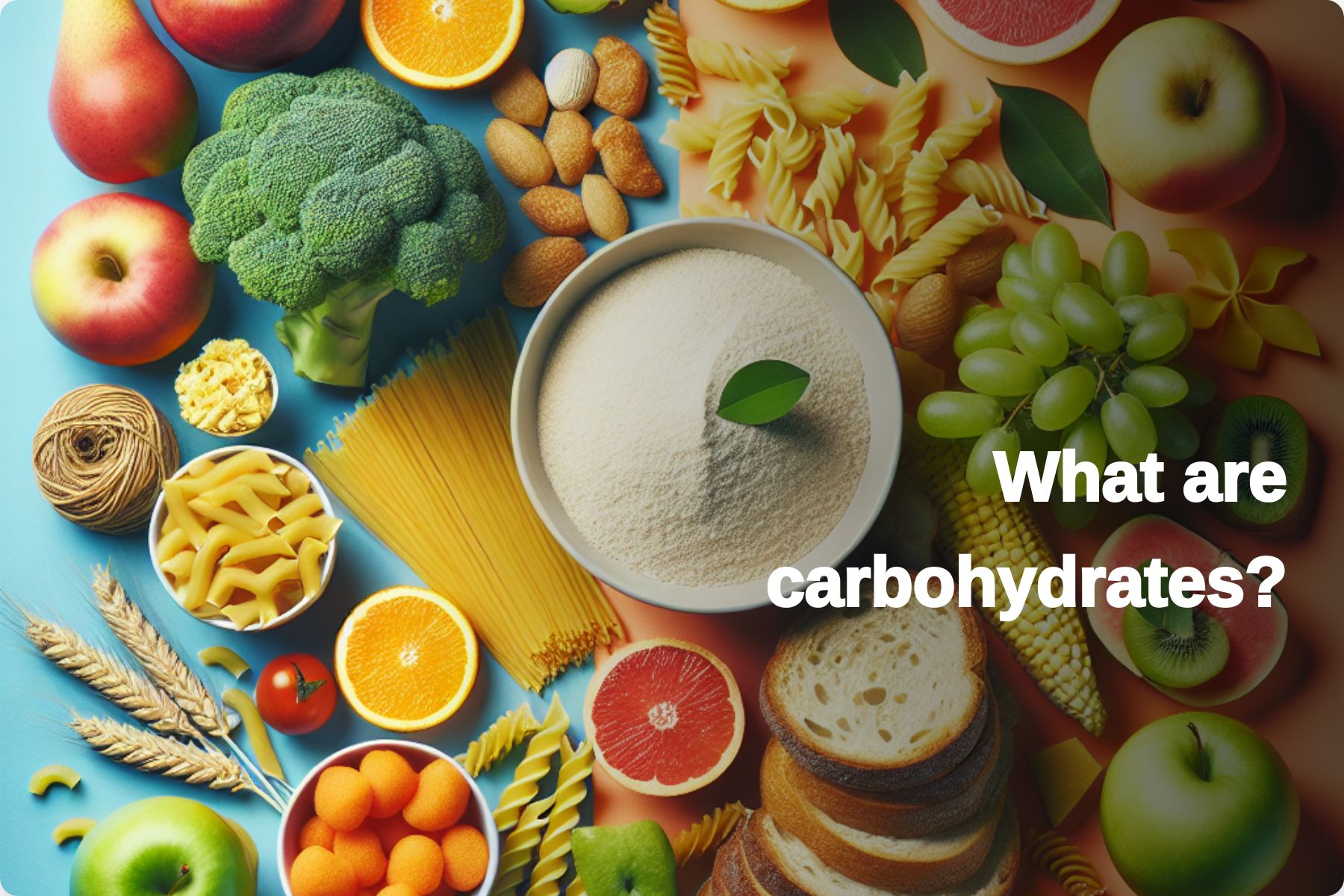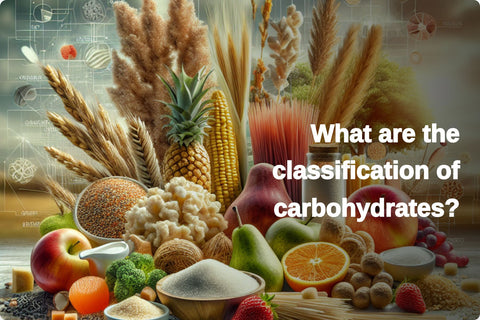
What are carbohydrates?
Carbohydrates are a fundamental component of our daily diet, serving as a crucial macronutrient that plays a vital role in supporting our body's functions.
In essence, carbohydrates are organic molecules consisting of carbon, hydrogen, and oxygen. They are our body's primary source of energy, fueling various physiological processes. Picture them as the gasoline that keeps our biological engine running smoothly. From powering brain functions to aiding muscle contractions, carbohydrates are the unsung heroes behind our daily activities.
When we consume carbohydrates, our digestive system breaks them down into simpler sugars like glucose, which is then readily absorbed into the bloodstream. This glucose provides the energy necessary for our cells to carry out their functions efficiently. Therefore, carbohydrates aren't just about maintaining a balanced diet; they are integral to our overall well-being.

Carbohydrates Definition
Carbohydrates, often referred to as carbs, are organic compounds made up of carbon, hydrogen, and oxygen atoms. These macronutrients are a cornerstone of our diet, serving as a primary source of energy for our bodies. To understand carbohydrates better, let's break down their definition and delve into their molecular structure.
At its core, a carbohydrate is a combination of carbon (C), hydrogen (H), and oxygen (O) atoms, typically in a ratio of 1:2:1. This simple yet powerful arrangement forms the building blocks that fuel our daily activities. The key feature distinguishing carbohydrates from other macronutrients is this specific composition.
The most basic unit of a carbohydrate is a monosaccharide, commonly known as a simple sugar. Glucose, fructose, and galactose are prime examples of monosaccharides. These single sugar molecules are the starting point for more complex carbohydrates, such as disaccharides and polysaccharides.
Disaccharides, formed by the combination of two monosaccharides, include familiar sugars like sucrose (table sugar) and lactose (found in dairy products).
Polysaccharides, on the other hand, consist of long chains of glucose molecules and serve as energy storage or structural components in plants and animals. Glycogen in animals and starch in plants are common examples of polysaccharides.
Types of Carbohydrates
Carbohydrates are categorized based on their chemical structure and the complexity of their molecules. Here are the main types of carbohydrates:
-
Monosaccharides
Simple sugars with a single sugar unit.
Examples: Glucose, Fructose, Galactose.
-
Disaccharides
Consist of two monosaccharide units linked together.
Examples: Sucrose (glucose + fructose), Lactose (glucose + galactose), Maltose (glucose + glucose).
-
Oligosaccharides
Contain 3 to 10 monosaccharide units.
Examples: Raffinose, Stachyose.
Found in foods like legumes, beans, and certain vegetables.
-
Polysaccharides
Long chains of monosaccharide units, typically more than ten.
Examples: Starch, Glycogen, Cellulose.
Starch: Plant storage form of glucose.
Glycogen: Animal storage form of glucose, primarily in liver and muscle cells.
Cellulose: Structural component of plant cell walls, not digestible by humans.
Functions and Importance of Carbohydrates
Carbs are like the body's main fuel. They do a lot for our health. Let's talk about what they do in simple terms.
Making Energy: Carbs are what our body uses for energy. When we eat them, our body turns them into a sugar called glucose. This glucose goes into our blood, and cells use it to make energy called ATP. This helps our muscles move, keeps our body warm, and makes our organs work.
Helping the Body Work: Carbs don't just give energy; they also help in making other things our body needs, like proteins and fats. They also help control our blood sugar levels, which is important for staying healthy. Eating the right amount of carbs makes sure these processes work well.
Saving Energy: Our body can store extra glucose as something called glycogen, mainly in our liver and muscles. When we don't eat enough or need more energy, our body uses this stored glycogen to keep our blood sugar levels steady and provide energy. It's like a backup system.
Brain Power: Our brain needs a lot of energy, and it mostly uses glucose. Carbs give the brain a quick and easy supply of glucose. This helps our brain work well, improving things like memory and concentration. Eating the right carbs helps our brain do its job.
Keeping Us Healthy: Eating a good mix of carbs, like whole grains and veggies, is important for overall health. These carbs don't just give energy; they also have important nutrients and fiber. Fiber is good for digestion, controls cholesterol, and helps us feel full, which can help with keeping a healthy weight.
In short, carbs do more than just give us a quick energy boost. They are essential for our body to work well. Whether it's giving us energy for the day, helping our body function, or keeping our brain sharp, carbs are super important. Finding the right balance in what we eat is the key to making sure carbs keep us healthy and full of life.

Carbohydrate: A vital nutrient
In summary, our exploration of carbohydrates has revealed their important role in keeping us healthy and energetic. Let's go over the main points and highlight why it's essential to have a balanced intake of carbohydrates for overall well-being.
-
Types of Carbs:
Carbs can be simple or complex.
Simple ones, like sugars, give quick energy but can cause high blood sugar.
Complex ones, in starches and fibers, provide steady energy and promote overall health.
-
What Carbs are Made of:
Carbs have carbon, hydrogen, and oxygen.
Simple carbs are monosaccharides and disaccharides; complex ones are starches and fibers.
-
Carbs' Jobs:
They fuel our daily activities by making glucose for energy.
Carbs help make proteins and control blood sugar.
Extra glucose becomes glycogen for a steady energy supply.
They also help the brain work well.
-
How Carbs Affect Health:
Balanced carb intake is vital for overall health.
Choosing whole grains, fruits, and veggies gives energy and important nutrients.
Fiber from these foods helps digestion, controls cholesterol, and aids weight management.
-
Finding the Right Balance:
Carbs are necessary, but balance is crucial.
Have different types of carbs for a well-rounded diet.
Be cautious with sugars and processed foods; focus on whole, nutrient-rich choices.
Don't fear carbs but understand and welcome them for good health. Make smart choices, appreciate carb diversity, and know their impact on our body. Aim for a balanced diet, letting carbs be the dependable energy source that keeps us active, sharp, and thriving.
This Blog post is an initiative by Lo! Foods, to provide accurate and Nutritionist / Doctor approved information related to Health. Lo! Foods is India's leading brand for Everyday Functional Foods. Foods designed for specific Health conditions or Needs. Lo! Foods also runs India's largest range of Low Carb Healthy Cloud Kitchens, under the brand names of Lo!, ProteinChef, ATH (All Things Healthy) and DiabeSmart.















Leave a comment
Your email address will not be published.